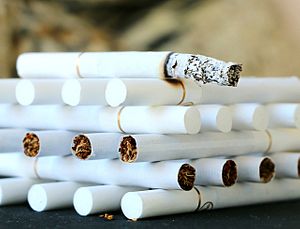On Tuesday, a highly anticipated anti-smoking bill was passed in Japan’s lower house, opening the door to banning indoor smoking across schools, hospitals, and government buildings. Under the newly revised Health Promotion Law, Japan’s relaxed attitude to tobacco control — rated poorly by the World Health Organization (WHO) — will be confronted with tougher restrictions and fines. It’s the first time Japan will introduce anti-smoking measures that carry financial penalties for rule breakers.
After battling resistance in the Diet from pro-tobacco Liberal Democratic Party (LDP) members and the hospitality industry for 18 months, the Ministry of Health’s push to curb secondhand smoke is a step forward in a country where the white paper on the effects of tobacco remained unrevised for 15 years. While the bill supports nonsmoking in principle at offices and hotels, existing drinking and eating establishments are exempt from the ban if a separate smoking room is installed. However, eateries with a seating space of up to 100 square meters and capital totaling 50 million yen ($454,000) are exempt entirely as long as a smoking sign is displayed outside.
Japan is a smoker’s paradise. First-time visitors are confused to learn that smoking in public is illegal and only tolerated on private property or in designated smoking areas outside. Japan’s restaurant and nightlife industries are famous for allowing patrons to wine, dine, and smoke inside simultaneously — entrenching a widespread normalization of indoor smoking as inconceivable without a traditional sake or beer in hand.
In January, Prime Minister Shinzo Abe vowed to take tougher measures to lower the smoking ratio and prevent exposure to secondhand smoke. But Japan has fallen embarrassingly short of the WHO and International Olympic Committee’s (IOC) complete ban on indoor smoking in all public places. Since signing the WHO Framework on Tobacco Control in 2004, Japan ranks low among advanced nations in advocating legally binding measures. Despite pressure from the IOC to provide a smoke-free sporting environment by 2020 — adhered to by recent Olympic hosts Britain, Canada, Russia, and Brazil — Japan could be the first to go against upholding a total ban.
The Ministry of Health’s original attempt to roll out a strict smoking ban was blocked. It stalled as it was sent back to be revised based on disagreements over the size of restaurants eligible for exemption. Thanks to small businesses who petitioned against losing customers and LDP members who pushed for the “right to smoke,” the LDP’s revised draft eased the restrictions. The original proposal exempt offices, hotels, and restaurants with a floor space of up to 30 square meters from the smoking ban; the new bill extended that exemption to restaurants with floor spaces of up to 100 square meters. Corned by the LDP, the Ministry for Health presented a watered down draft of the Health Promotion Act, allowing 55 percent of restaurants to continue business as usual.
The Ministry of Health originally began drafting a strict zero tolerance amendment to the Health Promotion Law in late 2016 as a part of a six-year anti-cancer initiative. However the final bill submitted by the central government was scrutinized for gaping loopholes rendering the anti-passive smoking initiatives virtually meaningless. The government’s contradictory health policies in warning of the dangers of secondhand smoke has been exposed as a conflict of interest since the Finance Ministry owns a 30 percent stake in Japan Tobacco Inc. — the world’s third largest transnational tobacco corporation.
The WHO’s anti-smoking steps require eight types of public places to be tobacco-free — Japan bans smoking in only four types of public places. Although the minister in charge of the Olympics supported a modest tobacco control policy to appease the ruling LDP, the Tokyo Metropolitan government, headed by Mayor Yuriko Koike, is likely to win support to impose a far stricter ordinance compared to the central government bill applicable for Tokyo city beginning in stages from April 2020.

































